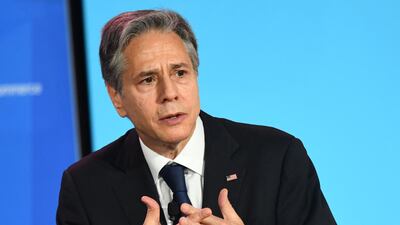US Secretary of State Antony Blinken said on Thursday that Iran's latest “provocations” around its nuclear programme could bring a “deepening” crisis and more economic and political isolation for Tehran.
Mr Blinken's statement came after the 35-nation board of governors of the UN's nuclear watchdog overwhelmingly passed a resolution criticising Iran for a lack of co-operation with the nuclear inspectorate.
And the International Atomic Energy Agency on Thursday said Iran had so far removed 27 surveillance cameras at its nuclear sites.
“Unfortunately, Iran's initial response to the board’s action has not been to address the lack of co-operation and transparency that prompted a negative report from the IAEA director general and such strong concern in the board, but instead to threaten further nuclear provocations and further reductions of transparency,” Mr Blinken said.
“Such steps would be counter-productive and would further complicate our efforts to return to full implementation of” the Iran nuclear deal from which the US pulled out in 2018.
“The only outcome of such a path will be a deepening nuclear crisis and further economic and political isolation for Iran. We continue to press Iran to choose diplomacy and de-escalation instead."
He said Iran must co-operate with the agency and provide technically credible information in response to its questions, and that Tehran must drop recent “extraneous” demands that were not part of the original nuclear deal.
Iran has demanded that the US delist the powerful Islamic Revolutionary Guard Corps (IRGC) from a terrorism designation, a request that was not part of the original deal.
US President Joe Biden's administration says it still seeks a return to the Iran nuclear deal, signed in Vienna in 2015, but for now, that looks unlikely.
The agency's director general, Rafael Grossi, said on Monday it would be “a matter of just a few weeks” before Iran could obtain enough material needed for a nuclear weapon if it continued to develop its programme.
Meanwhile, US special envoy on Iran Robert Malley called on Tehran to drop conditions such as delisting the Islamic Revolutionary Guard Corps as a terrorist organisation .
"Iran just needs to decide to drop its extraneous demands and agree to the deal that’s been available since March," Mr Malley tweeted.
He said the US could lift sanctions if Tehran co-operated with the IAEA.
That co-operation would entail resolving outstanding safeguard issues and Iran's return to the deal, "thereby addressing urgent international non-proliferation concerns and achieving US sanctions lifting", Mr Malley wrote.
"The choice is theirs."


